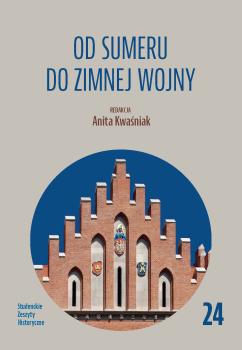Opór wobec poboru wojskowego w Stanach Zjednoczonych Ameryki podczas Wielkiej Wojny na podstawie wspomnień tzw. conscientious objectors .......... 203
Streszczenie
Formowane struktury wojskowe po wypowiedzeniu wojny Rzeszy Niemieckiej przez Stany Zjednoczone Ameryki nie uzyskały aprobaty niektórych grup społecznych. Zaliczali się do nich reprezentanci mniejszości chrześcijańskich, zwolennicy poglądów socjalistycznych i anarchistycznych oraz pacyfiści. Rząd federalny podjął działania mające na celu wyciagnięcie konsekwencji wobec stawiających opór. Celem artykułu jest odpowiedź na pytanie, jakimi motywami kierowali się tzw. conscientious objectors oraz jak wyglądała ich ścieżka po podjęciu decyzji o niezaangażowaniu się w struktury wojskowe. Wybrane źródła pamiętnikarskie spisane przez samych objectors umożliwią prześledzenie indywidualnych pobudek oraz przeszłości, które determinowały ich podejście do zaangażowania się ojczyzny w wojnę po stronie aliantów. Pozwoli to na odwzorowanie charakteru poszczególnych jednostek, reprezentujących poglądy zyskujące wówczas na popularności w społeczeństwie amerykańskim. Artykuł wpierw skupia się na przeanalizowaniu czynnika etnicznego w polityce względem aliantów oraz państw centralnych zarówno przed wojną, jak i w jej trakcie. Na podstawie statystyki imigracji do Stanów Zjednoczonych przedstawiono wpływ poszczególnych pokoleń: znaturalizowanych oraz tych w pierwszym i drugim pokoleniu. W zarysie wydarzeń poprowadzono narrację poprzez wydarzenia polityczne – od reformy doktryny Monroego na przełomie XIX i XX w. do konkretnych przyczyn wypowiedzenia wojny Rzeszy Niemieckiej przez Stany Zjednoczone Ameryki i reakcji na tzw. froncie wewnętrznym (Homefront). W tle pojawia się charakterystyka nowych stowarzyszeń ukonstytuowanych podczas reform epoki progresywizmu za prezydentury Theodore’a Roosevelta oraz Thomasa Woodrowa Wilsona. Przedstawiono także podstawy prawne, na mocy których egzekwowano kary wydawane przez aparat administracji wojskowej. Scharakteryzowano również sam schemat początkowego systemu poboru wojskowego, jego przebieg oraz skutki działania w ramach poszczególnych etapów. Sedno artykułu analizuje fragmenty życiorysów Arthura Dunhama – pacyfisty oraz społecznika, przynależącego przed wojną do zgromadzenia prezbiteriańskiego, Alberta Votha – menonity oraz pacyfisty, a także Philipa Grossera – anarchisty i (co może się wydawać sprzeczne) pacyfisty. Bazę źródłową poddano analizie na tle wyznawanych przekonań conscientious objectors, za które byli skłonni odbywać surowe kary.





